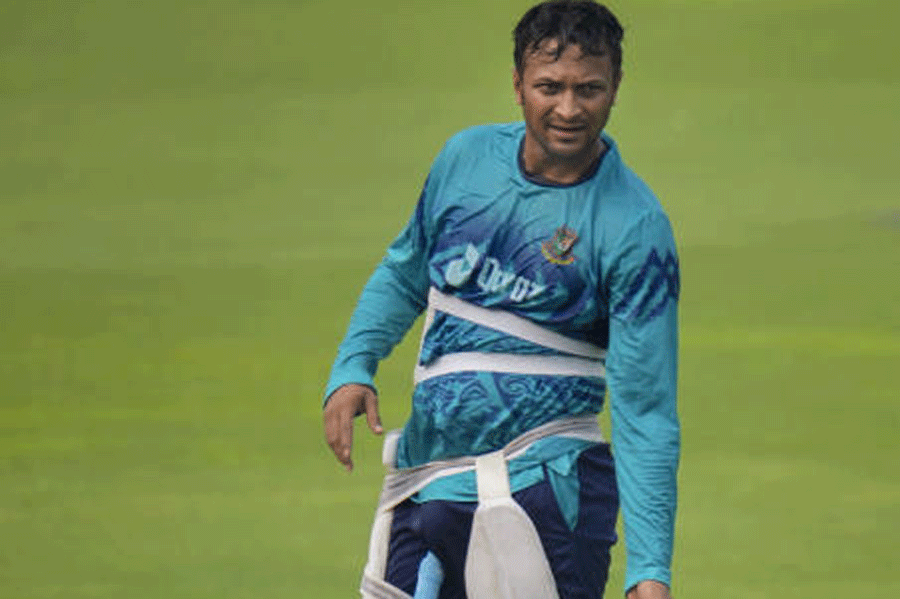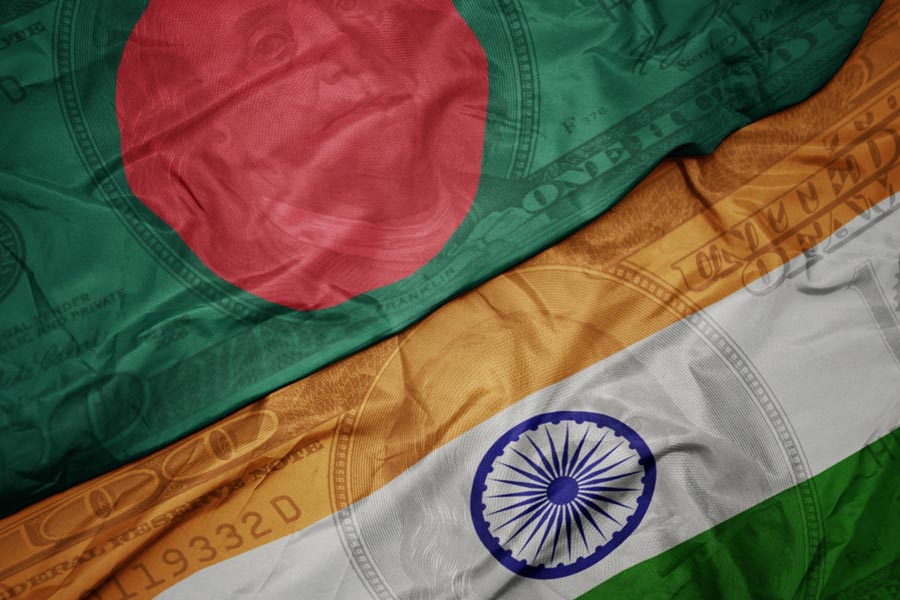From former Prime Minister Sheikh Hasina to cricket superstar Shakib Al Hasan, the new regime in Bangladesh has brought murder charges against a slew of people in what looks like a roving political witch-hunt.
Also implicated in the same case are Hasina’s son Sajeeb Wazed Joy, daughter Saima Wazed Putul, at least seven journalists and senior Awami League leaders, among others.
Shakib played a major role in Bangladesh registering their first Test win against Pakistan, skittling out the hosts for 146 in the second innings by taking three wickets on Sunday. (See Sport)
The case involves the death of Nayeem Howlader, 17-year-old student of a college in Dhaka, in the Jatrabari area on July 19 during the violent anti-quota protests that unseated Hasina on August 5.
Police sources said the dead teen’s father, Kamrul Islam, had filed the case with Jatrabari police station on Thursday, naming Hasina and 192 others.
“All these people are involved in the case; else I would not have named them.... These people incited the law enforcers to fire,” Islam told The Telegraph over the phone from Dhaka.
Asked how the accused could have incited the law enforcers, he refused to elaborate, saying he would explain it “at the right time”.
With the murmurs of political vindictiveness threatening to undermine the new regime’s image, Asif Nazrul, law adviser to the interim government, told the media that the parents of a slain student cannot be prevented from filing a case.
Hasina’s ouster has brought to power an interim government under the leadership of Peace Nobel winner Muhammad Yunus, who is expected to establish the rule of law, revive the economy and pave the way for an election.
But Bangladesh has over the last 20 days witnessed a witch-hunt so sweeping — with murder cases slapped on politicians, cricketers, journalists and civil society members — that fear has engulfed the country, raising the question whether Yunus is in full control of the dispensation he helms.
Yunus’s promise to restore order seems a far cry at a time when mob rule has become the order of the day, one of the seven journalists implicated by Islam said.
“I don’t think he (Yunus) has control over what’s happening.... It’s true that he was victimised by the earlier regime. A large part of our media, which was under the Awami League’s control, was not fair to him. But he won’t stoop so low to settle scores with scribes,” the journalist said.
The “politics of vengeance” is being spearheaded by sections of BNP and Jamaat-e-Islami leaders and their cronies who are in control of the civil and police administration, the journalist said.
“Shakib was playing (league cricket) in Canada when this boy unfortunately died.... Yes, he (Shakib) was an Awami League MP, but that can’t make him a murder accused,” the journalist added.
However, some opinion makers in Bangladesh have worryingly been justifying the developments citing the country’s history of bloodshed and revenge attacks accompanying regime changes.
In the last 20 days, hundreds close to the Awami League dispensation and many law enforcers have been killed and thousands across the country faced attacks.
“You (Indians) don’t worry.... These things do happen in our country. The Awami League also attacked the BNP and Jamaat after coming to power,” a newspaper editor told this correspondent.
A former diplomat who had unsuccessfully tried to cosy up to the Hasina government resorted to whataboutery to deflect concerns about the large-scale human rights violations. Vulnerable groups like the minority Hindus have been facing attacks since Hasina’s fall.
“One must understand the extreme emotional outbursts immediately following a revolution of this kind. History is replete with this phenomenon,” he said.
Saner voices have, however, raised questions about the murder charges against journalists and the attacks on media establishments. Two journalists known to have been close to the Hasina government had been arrested in another case before the new case was slapped on them.
“Even if they (the two journalists already under arrest) were big supporters of the discredited regime, they did not break any established law. The way to handle them is to criticise their journalism and expose their partisanship, but they cannot be jailed,” Mahfuz Anam, editor of The Daily Star, the most prominent English daily in Bangladesh, wrote in his column.
“These actions are creating fear among journalists, raising the question as to whether we are returning to the old ways with the victims changing — instead of pro-BNP journalists, the victims are now the pro-Awami League journalists,” Anam, often a fierce critic of the Hasina government, added.
Anam also expressed concern at the way murder charges have been brought against former ministers, judges, lawyers and scholars.
His observations are significant, said a source in Dhaka, referring to Anam’s long association with Yunus, especially during the tumultuous days of 2006 and 2008 when the economist had floated a political platform.
“If he is criticising the unfolding developments, this means the chief adviser (to the interim government, that is, Yunus) must be on the same page with him,” the source said.
A veteran lawyer in Bangladesh said the policy of filing these murder charges was a faulty one.
“The law enforcers cannot prove them.... The cases will linger. Some people can be harassed in these cases, but the regime will lose credibility in the eyes of the people,” he said.











